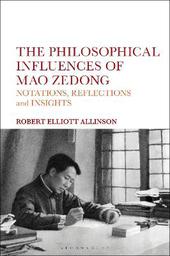
|
The Philosophical Influences of Mao Zedong: Notations, Reflections and Insights
Hardback
Main Details
| Title |
The Philosophical Influences of Mao Zedong: Notations, Reflections and Insights
|
| Authors and Contributors |
By (author) Robert Elliott Allinson
|
| Physical Properties |
| Format:Hardback | | Pages:256 | | Dimensions(mm): Height 234,Width 156 |
|
| Category/Genre | Non-western philosophy
Oriental and Indian philosophy
Social and political philosophy |
|---|
| ISBN/Barcode |
9781350059863
|
| Classifications | Dewey:335.4345 |
|---|
| Audience | | Tertiary Education (US: College) | |
|---|
|
Publishing Details |
| Publisher |
Bloomsbury Publishing PLC
|
| Imprint |
Bloomsbury Academic
|
| Publication Date |
19 September 2019 |
| Publication Country |
United Kingdom
|
Description
This philosophical Mao is a fresh portrait of the mind of the ruler who changed the face of China in the twentieth century. The book traces the influences of both traditional Chinese and traditional pre-Marxist Western philosophy on the early Mao and how these influences guided the development of his thought. It reveals evidence of the creative dimensions of Mao's thinking and how he wove the yin/yang pattern of change depicted in the Yijing, the Chinese Book of Changes, into the Marxist dialectic to bring ancient Chinese philosophy to mark changes in twentieth century thought. Mao's lifetime philosophical journey includes his interpretations of and comments on both Chinese and Western philosophers. His deep, metaphysical reflections, uncanny prognostications and pensive speculations from his early pre-Marxist period to his later philosophical years prove to be as startling as they are thought-provoking.
Author Biography
Robert Elliott Allinson is Professor of Philosophy at Soka University of America, USA and former Professor at The Chinese University of Hong Kong, Hong Kong.
ReviewsMao Ze Dong is celebrated (or cursed) as a revolutionary leader, but the philosophical foundation of his activity is largely ignored. In his superb study, Allinson fills in this lack. Mao's thought is not just located in its historical context; its complex references to the Chinese traditional thought, to Marx and Western philosophy, but also to modern sciences (quantum physics), are explored and documented. A new Mao thus emerges, a Mao whose radical acts are grounded in a thick texture of philosophical reflections. Allinson's Mao is indispensable for everybody who wants to understand not just Mao but the concatenation of philosophy and politics that characterized the twentieth century. * Slavoj Zizek, International Director of the Birkbeck Institute for the Humanities, University of London, UK * Through extensive research, involving not only Mao's writings themselves but also the marginal notes he made on books he read, Allinson is able to trace the development of Mao's thinking over the course of his lifetime and to demonstrate the degree to which he was actively engaged with both the Chinese and Western philosophical traditions throughout. This is an invaluable contribution to our understanding of the intellectual history of China. * Michael Puett, Walter C. Klein Professor of Chinese History and Anthropology, Harvard University, USA * Has it ever occurred to you to associate Mao with Aristotle or with the ancient Chinese Book of Changes, the Yijing? If you find it hard to believe, read this book by Robert Allinson who, in his own philosophical way, manages to inject new life and revived interest in this highly controversial but iconic figure which is still looming large behind the giant video screen of present day China. * Anne Cheng, Chair of Chinese Intellectual History, College de France, Paris, France * This is a most exciting and fascinating enterprise. A magnificent statement on behalf of East-West philosophy. * Irene Eber, Former Director and Louis Frieberg Professor Emerita of Chinese History and Philosophy, Louis Frieberg Center for East Asian Studies, Hebrew University of Jerusalem, Israel and Former Senior Fellow, Harry S. Truman Research Institute for the Advancement of Peace, Hebrew University of Jerusalem, Israel * As Irene Eber writes in her foreword to this book, "This is a ground breaking work". She is right, for it is indeed a work of utmost importance. In addition, the book is essential because it deals with a highly topical issue, one that can certainly help us to improve our understanding of contemporary China . . . Allinson achieves his goals in this book by clearly demonstrating a thoughtfully elaborated case of a truly intercultural, and, at the same time, truly intersubjective philosophy with widely influential connotations. This volume will be of great value to anyone interested in Chinese or cross-cultural philosophy, political theory and recent history. * Jana Rosker, chief editor of Asian Studies and the founder and first president of the European Association of Chinese Philosophy (International Communication of Chinese Culture) *
|